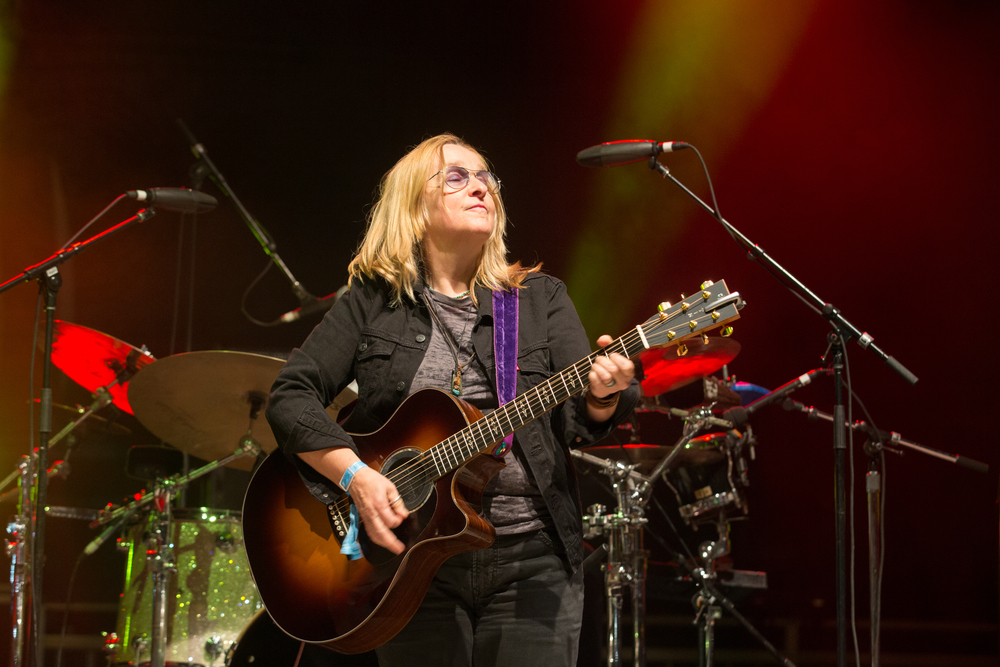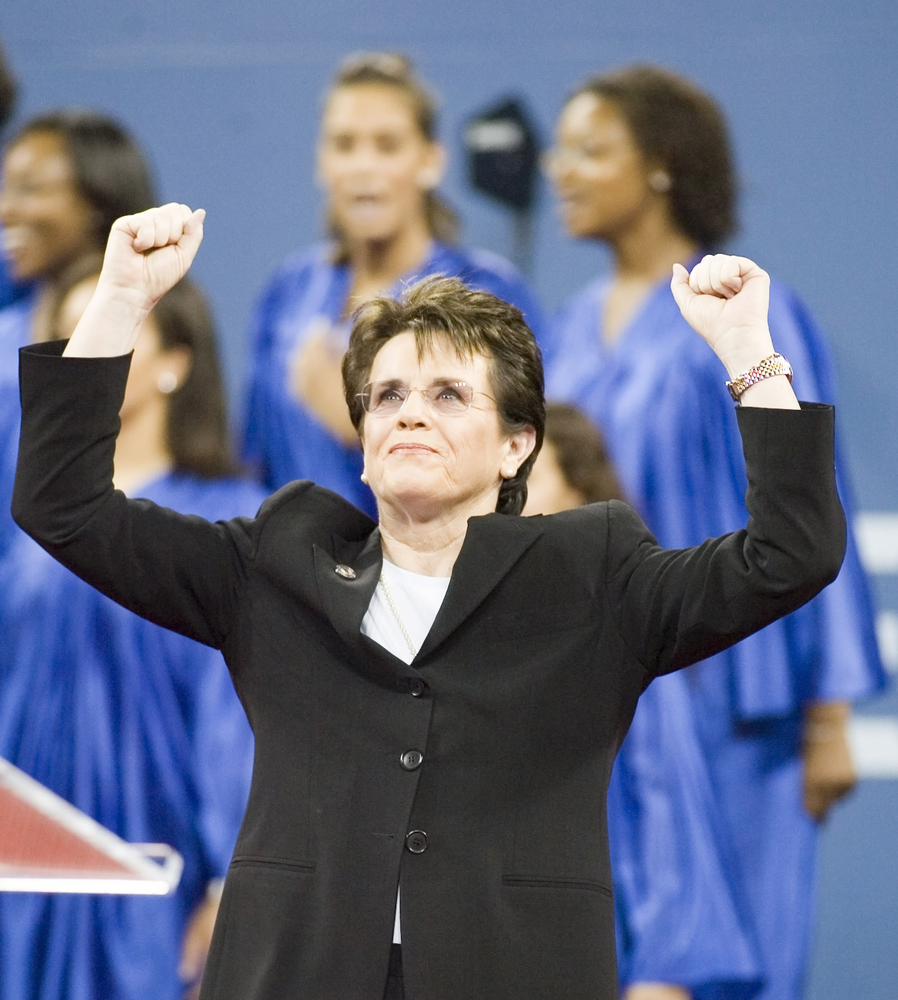
About a year ago, activist Stephanie Sandberg found herself doing what many gay women have done during the age of Trump: commiserating with a pal about the state of the union. “My friend said, ‘If people would just spend more time doing something rather than complaining, because here we are talking, tweeting, making fun,’” Sandberg remembers.
“Then he said to me, ‘Well, you probably already are.’ And I never forgot that, because I thought, ‘You know what? I’m not doing much.’”
Sandberg is perhaps exaggerating her lack of action. The California native spent a long career as a publishing and marketing executive at a wide array of publications—including The New Republic, where she was president and publisher — before turning to LGTBQ activism. In 2015, she became a managing director at Out Leadership, a consulting firm that advises corporations on LGBTQ inclusion. But while the mission-based organization was well-positioned for the Obama years, the Trump administration seemed to demand something else.
That’s a key reason why Sandberg took a leap into politics this spring. In May, she took over as executive director of LPAC, a political action committee that was started in 2012 with the aim of galvanizing LGBTQ women into a political force. “Like so many people, I’m tired of waking up in a rage,” says Sandberg. “I’m getting less sleep now, but I don’t mind if it’s in the service of something that honestly has the potential to make a difference in a very direct way.”
We recently spoke to Sandberg — who lives in Princeton, NJ, with her wife and two kids — about her dreams for LPAC, the committee’s plans for the midterms, and why gay men and lesbians have less in common than most organizations think.

GO: Let’s begin with LPAC: What is it, and why does it matter to GO readers?
SS: LPAC exists with the sole purpose of engaging LGBTQ women in politics. We’re a political action committee, so the money we raise goes to supporting our endorsed candidates, who are mostly LGBTQ women and women of color.
We’re the only political organization for LGBTQ women, but we’re also a values-based PAC, as opposed to an identity-based one. Our values are LGBTQ and women’s equality, and social justice. We represent and engage LGBTQ women, and invest in candidates who can best deliver on our values. I imagine most of your readers embrace those values, and seek change from the current political environment. Who better to trust as change-makers than LGBTQ women and women of color? And who is investing in these candidates? LPAC.
GO: How much do you invest in races? What’s your donor base?
SS: Since its founding in 2012, LPAC has spent more than $1.6 million directly on supporting political candidates and another $1.6 million on communications and organizing in support of our candidates. From our activist and donor side, I’m looking forward to expanding our base (we currently have nearly 4,000 donors from every state) and being aggressively inclusive. Lesbian, bi, queer, transgender–however you identify along the LGBTQ women spectrum, we want you to feel recognized and included.
That’s why I hope GO readers will join us at Levity & Justice for All, our annual comedy benefit in NYC on June 20. It’s a night of community with 1,000+ LPAC supporters, and it provides the biggest chunk of our political funding for the year. You can learn more about the event on our website, teamlpac.com.
GO: You grew up in both southern and northern California. How important was politics in your family when you were young?
SS: My parents were good, old-fashioned Republicans. My mother was quite engaged, and I had an early awareness and admiration for that. When I was a little kid, she would have over whoever was running for office locally for a tea with all of her Republican friends—and the lone Democrat she knew. She once even ran for the school board and didn’t win. As she said at the time, there were two women who ran, and they split the vote—there was no way our little town was going to support two women at the same time.
GO: You weren’t involved in politics for most of your career, but you did spend a long time working in the media. How did you end up going into the business side of publishing?
SS: While I was a Creative Writing and English major in college, at work I’ve always been drawn to action. And from the business side, I still got to hang out with all of these terrific, smart people at places like The New Republic, while figuring out how to change things in an entrepreneurial fashion and reposition a mission-driven organization so that it could adapt to these modern media times. That was a privilege.
GO: When you first moved to Out Leadership, one of your first initiatives was to launch a networking group for women. Did you feel as if something like that was missing from the conversation surrounding LGBTQ issues?
SS: As much as we love our gay brethren, there’s a cultural divide. Companies look at LGBTQ as monolithic, but we often couldn’t be more different. Gay men and lesbians have less in common culturally than the straight people between them. Out Leadership would host these conferences, and companies were encouraged to send their most promising LGBT leaders. And who would show up? Mostly, men. So we launched Out Women to fill that need.
GO: How much did your own experiences and sexual identity play into that?
SS: For starters, I didn’t come out until my early 30s, and then I embarrassed myself for a little bit, because I just told everybody, all the time, that I was gay. I don’t present one way or the other, but I’m assumed to be straight by most people if they don’t know. In a way, I got away with heterosexual privilege for a long time, and anyone like me owes a huge debt of gratitude for countless others—like LPAC founder, Urvashi Vaid—who have been in the fight their entire adult lives. My wife and I had a big wedding in 1999, obviously before it was legal, but we assumed we should have a big party. We went to Human Rights Campaign dinners, and we gave money and marched, but we weren’t always at the barricades. So I recognize from my own experience that many gay women are leading quieter lives, even when they’re out and supportive. A lot of businesswomen, for example, are not out—they’re just busy, and they go home to their families. Those are the some of the people I want to reach—I want to channel their desire to be supportive and be part of the community by giving them an opportunity like LPAC. Of course, I’d like LPAC to be as inclusive as possible–so reaching out to younger generations, in particular, is a priority.
GO: LPAC has endorsed 14 candidates so far this year, and a few have already had big wins: Gina Ortiz Jones, running for Congress, and Lupe Valdez, running for governor – both gay women from Texas – and Stacey Abrams, the African American gubernatorial candidate from Georgia, won their primaries. You must be happy?
SS: Thrilled! LPAC is proud to have been in those races early, and brought attention and support. Honestly, all three are smashing barriers and expectations, and all represent the future of progressive politics.
GO: Finally, tell us more about your annual fundraiser coming up
SS: Levity & Justice for ALL is the biggest women’s political fundraiser during New York Pride week and it will be a blast. This will be our third year hosting LGBTQ women comedians – this year Chaunté Wayans, AB Cassidy, Pat Brown, Judy Gold, and Sandra Valls, with Kate Clinton hosting. Most importantly, the event will honor Billie Jean King, who of course has paved the way for us all on women’s and LGBTQ equality. Melissa Etheridge will present her award and the group BETTY will perform.
GO: How can GO readers purchase tickets?
SS: Thanks for asking – race to teamlpac.com/levity!

What Do You Think?